One of Wrightsville Beach’s iconic shorebirds, the black-and-orange beaked black skimmer, is breaking records during this summer’s nesting season. Bird nest numbers at the south end have increased significantly over 2014.
“We did the black skimmer census and we counted 175 nests. … That’s the highest count we’ve had at Wrightsville Beach,” said Lindsay Addison, a coastal biologist for Audubon North Carolina. Addison said this accounts for about 21 percent of the state’s black skimmers.
In 2014, Audubon counted 101 black skimmer nests in the colony.
“It’s been a good site for skimmers over the past five or six years. … When they do well at a site, they tend to come back the nest year because those are probably many of the same individuals that were there last year,” Addison said. “They’re also very social birds, so when they see other black skimmers start landing in an area and start nesting and doing courtship behavior, other birds will join up because they’re colonial.”
Other bird species have increased in number, as well. In 2014, only three least tern nests were on the south end. This year, Audubon has counted 232 nests.
“Last year, the numbers were down … because we had a disturbance at the site because of the dredging project that was going on there. That project started April 4 and unfortunately that’s when bird nesting season starts — early April. … This year, the habitat is undisturbed. It’s the habitat they like, open sand with sparse vegetation, so they’re back in good numbers.”
Audubon staff and volunteers have also been monitoring the young birds.
“Both the skimmers and the terns started hatching out their chicks during the first week of June. They’re both doing very well — a lot of chicks on the ground,” Addison said.
Addison said the fence of string around the nesting site and the signs asking people to keep out have been successful.
“Primarily, what we want to accomplish with the bird posting and the volunteers and all the work we do is that if the chicks don’t do well, they don’t succeed for natural reasons,” she said. “It’s hard to be a bird. It’s hard to raise your young on the beach — it’s a harsh environment.”
Addison said extreme heat can cause hatching numbers to dwindle.
“There’s heat stress. Sometimes you get a pair that isn’t very good at being parents yet. … Maybe they don’t shade the chicks well enough and the chicks overheat and die,” she said.
Periods of heavy rain can also be detrimental to the birds because they can get hypothermia. Human activity can be harmful to birds, too.
“There have been skimmer colonies in Florida where fireworks set off too close to them caused the abandonment of the colony, so the eggs and chicks were left and the adults didn’t come back,” Addison said. “If fireworks are set off in close proximity to a nesting colony, the noise and the flashes of light will spook the birds. The chicks will run — often, they’ll run out of the posting. . . .They’re separated from their parents when they’re depending on their parents for food.”
Fortunately, Addison has not witnessed this problem at Wrightsville’s south end.
“In the past five years or so, we haven’t had anybody come down to the south end and set off fireworks,” she said.
Addison is also grateful for the Wrightsville Beach Bird Stewards — a group of Audubon volunteers who lead educational bird walks around the nesting colony.
“It’s been a really great season. We’ve had a lot of people coming to the bird walks. Our volunteers have been talking to a lot of people on the beach. Folks have been enjoying the birds,” she said.
email [email protected]




